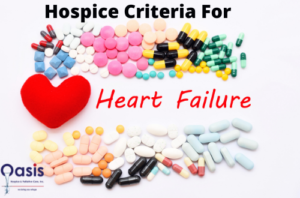These guidelines are intended to supplement a physician’s best clinical judgment when determining hospice eligibility. Due to comorbidities or rapid functional decline, a patient who does not meet these guidelines may still be eligible for hospice care.
If a patient meets the criteria below, they are considered in the terminal stage of cardiac disease. Criteria 1 and 2 MUST be present; factors 3 and 4 may be present but are not required. What are hospice criteria for heart failure?

1. At the Time Of Initial Hospice Certification Or Recertification:
The patient is already receiving optimal treatment with diuretics and vasodilators, which may include ACE inhibitors or a combination of hydralazine and nitrates. If side effects such as hypotension or hyperkalemia make it impossible to use ACE inhibitors or the combination of hydralazine and nitrates, this must be documented in the medical records.
OR
Patients with angina pectoris at rest resist standard nitrate therapy and are either not candidates for or refuse invasive procedures.
2. The patient has recurrent congestive heart failure (CHF) symptoms at rest and is classified as a New York Heart Association (NYHA) Class IV
- Unable to engage in any physical activity without experiencing symptoms;
- Symptoms are present even when the patient is at rest;
- Symptoms worsen when you engage in any physical activity.
3. Documentation of the following factors may be useful in determining prognosis in end-stage heart disease:
- Symptomatic supraventricular or ventricular arrhythmias that are resistant to treatment
- Previous cardiac arrest or resuscitation;
- Syncope with no known cause;
- A cardiac-related brain embolism;
- Concurrent HIV infection;
- Documentation of an ejection fraction of 20% or less (only if available)
If a patient meets the medical criteria listed above, they are automatically eligible for hospice care.
When Does Your Heart Disease Patient Qualify for Hospice Care
When a physician determines that a patient’s life expectancy is six months or less, the patient is eligible for hospice care if the disease runs its expected course.
Comorbid disease risk factors include:
- Hypertension
- Diabetes
- Coronary artery disease
- Cardiomyopathy in the family
- Myocardial infarction in the past
- Heart valve disease
End-of-life Disease Classifications of Hospice-Eligible Patients
End-stage Congestive Heart Disease Characteristics
- Suppose any of the following symptoms occur during less-than-normal activity (i.e., the patient is only comfortable at rest). In that case, the patient is classified as New York Heart Association (NYHA) Class III:
- Fatigue
- Palpitations
- Exercise-induced angina or dyspnea
NYHA Class IV symptoms include any of the following:
- At rest or with minimal exertion, dyspnea and other symptoms
- Inability to engage in physical activity without experiencing dyspnea and other symptoms
- When you engage in physical activity, your dyspnea and other symptoms will worsen.
- The patient receives optimal treatment for congestive heart failure with diuretics and vasodilators such as ACE inhibitors. They are being managed medically to the best of their ability with no surgical options available.
Risk Factors For Comorbid Heart Disease
- Hypertension
- Diabetes
- Coronary artery disease
- Cardiomyopathy in the family
- Myocardial infarction in the past
- Heart valve disease
End-stage Coronary Artery Disease Characteristics
At rest or with minimal activity, the patient experiences frequent or recurring bouts of angina pectoris.
- Despite standard nitrate therapy, the patient remains symptomatic.
- Invasive procedures, such as percutaneous angioplasty or coronary artery bypass surgery, are not appropriate for (or are refused by the patient).
Comorbidities:
- Chronic and/or persistent signs and symptoms of congestive heart failure
- Symptomatic supraventricular arrhythmias despite antiarrhythmic treatment
- Previous cardiac arrest and resuscitation
- Syncope history from any cause
- Cardiogenic cerebral embolism
- HIV infection and co-infection
- Failure of the kidneys
- COPD
- Acute coronary syndrome (CVA, or stroke)
- Failure of the liver
- Cancer
- Dementia
- Smoking
- Diabetes
- Hypertension
- Cholesterol levels are high.
- Coronary artery disease (CAD)
- >75 years old
Oasis Hospice makes these guidelines available as a helpful tool. They are not intended to replace a physician’s professional judgment. Whenever I’ve to choose hospice care, I prefer hospice near me.
What Precisely Is Congestive Heart Failure
According to the Centres for Disease Control and Prevention, more than 6 million adults have heart failure. You have heart failure when your heart fails to pump enough blood to your body. Blood that should be pumped out of your heart can become clogged, causing swelling and fluid buildup in your legs, abdomen, and even your lungs. Congestive heart failure occurs when there is fluid in the lungs due to heart failure.
Although heart failure is more common in the elderly, anyone can develop this progressive, chronic condition. High blood pressure, diabetes, a previous heart attack, and heart valve disease are all factors that contribute to heart failure. Obesity, chronic kidney disease, alcohol abuse, and smoking risk factors for developing heart failure.
Adult heart failure cannot be cured in the majority of cases. However, treatment can help to alleviate the symptoms. Certain medications, for example, can reduce excess fluid by increasing urination. A low-salt diet may also assist the body in eliminating excess fluid. Other drugs can help the heart pump more efficiently or contract with greater force.
Heart Failure Signs and Symptoms Include:
• exhaustion/weakness
• difficulty breathing
• gaining weight
• swollen legs and feet, belly, or lower back
• coughing
• When lying down, breathing becomes difficult.
• Sleeping comfortably with multiple pillows
• rapid heartbeat or palpitations
• Appetite loss
Oasis hospice care services are the best ones in the town. You can check out the criteria for pulmonary fibrosis. For information, contact us at (708) 564-4838.

